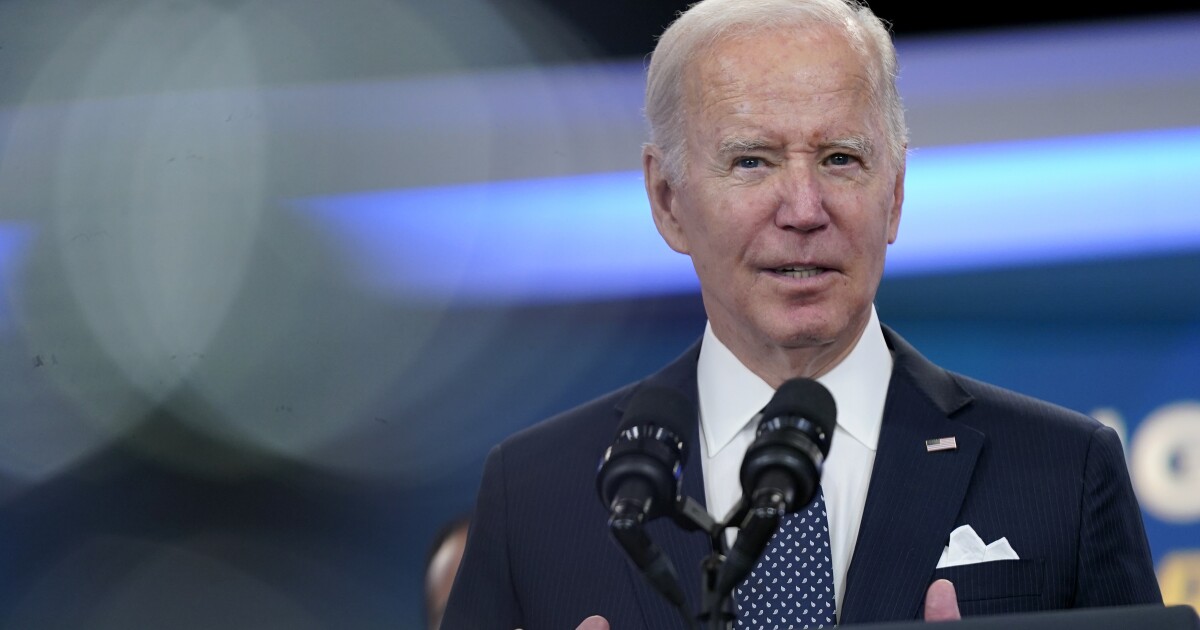

President Joe Biden‘s budget may be an aspirational document with no chance of clearing a GOP-controlled House, but it is also a political document as he braces for what is likely to be a bitter fight with Republicans over the debt ceiling before next year’s elections.
Biden hopes to use this as an opening argument against the Republicans before the debt ceiling battle begins in earnest.
HOW FLORIDA REPUBLICANS ARE CENTRAL TO RON DESANTIS’S SUCCESS IN 2024
Biden, who has repeated how budgets underscore values, will announce his fiscal 2024 framework in the battleground state of Pennsylvania on Thursday, an event overshadowed by the looming debt ceiling.
Biden has pledged not to negotiate with Republicans over raising the $31.4 trillion debt ceiling, contending the country’s credit rating is too important to risk a default. And despite the prospect of a deadline, far-reaching economic consequences, and the president’s desire to be a bipartisan deal-maker, Biden should “hold firm” in that strategy, according to Democrats such as former consultant Christopher Hahn.
“The House Republicans have members who are extremely vulnerable, and if the hard-liners in the party continue to play chicken with the full faith and credit of the United States, the 18 GOP members who hold seats in districts Biden won in 2020 will surely blink,” the former Chuck Schumer aide and Aggressive Progressive podcast host told the Washington Examiner. “Or at least enough to increase the debt ceiling.”
Biden has Republicans “in a bind” because he “rope-a-doped the GOP into taking Social Security and Medicare off the table during the State of the Union,” former Democratic operative Sandy Maisel added. Republicans shouted the president down during his address when he suggested lawmakers, including Sen. Rick Scott (R-FL), hoped to reform the entitlement programs.
“[On Thursday,] he will put forth his budget proposal, which progressives will think is too accommodating,” Maisel said. “Biden will challenge the GOP to come up with an alternative.”
“That, I assume, will either be so vague as to be meaningless — cut the waste, which, of course, cannot be isolated — or painful to lots of voters,” the Colby College visiting politics instructor and onetime candidate went on. “That will put Biden in a much better position to negotiate than he would be if he said he was ready to talk before the GOP had to put anything forward.”
Sen. Joe Manchin (D-WV) has vocally disapproved of Biden’s strategy, calling on his colleagues to “stop the madness and start acting reasonably and responsibly to get our government’s financial house in order.” Manchin sat down with House Speaker Kevin McCarthy (R-CA) in January to discuss the debt ceiling. The president met with McCarthy a few weeks later in February at the White House.
“There’s always times to have arguments and disagreements,” Manchin said last week on the Senate floor. “But the looming debt crisis cannot. It cannot basically have the disruption that we have and the discourse and political toxic atmosphere that we have here. We’ve got to come together for the sake of our great country.”
But while Biden is posturing, so too are Republicans. The House Republican Study Committee, for one, has distilled GOP priorities and identified possible presidential concessions, such as lowering fiscal 2024 discretionary spending to the fiscal 2022 level of $1.5 trillion, in addition to introducing a discretionary spending cap for up to 10 years, as well as reallocating unused American Rescue Plan Act, Infrastructure Investment and Jobs Act, and Inflation Reduction Act spending, before the House Budget Committee is due to respond to Biden on April 15.
Previews of Biden’s budget promote how it will decrease the federal debt by $3 trillion over a decade. He has also detailed his ideas for Medicare. Specifically, the president is pitching extending Medicare’s Hospital Insurance Trust Fund “by at least 25 years” by increasing the Medicare tax rate for people earning more than $400,000 from 3.8% to 5% and redirecting $200 billion in savings created by the Inflation Reduction Act’s prescription drug negotiation provisions to the Hospital Insurance Trust Fund. He is additionally expected to ask for $835 billion in defense spending and a 5.2% pay raise for federal employees.
Bipartisan Policy Center Senior Vice President Bill Hoagland, a budget expert, praised Biden for trying to decrease deficits but asserted that was “not going to reduce the level of debt to [gross domestic product] by a significant amount.”
“Just to stabilize the level of debt to GDP at where we are today, I think they need well into the $6 to $8 trillion mark,” he said.
Hoagland described Biden’s Medicare taxes as “pretty much dead on arrival with a Republican Congress.” Instead, the veteran Senate Republican staffer advocated broader simplification of the tax code, combined with efforts to decrease Medicare’s growth rate. For Hoagland, nondefense discretionary spending will have to be reduced by “a good 15% to 20%” if the president’s total discretionary top line is $1.7 trillion to meet Republicans’ $1.5 trillion demand.
“I’m worried about this,” he added. “You do have to negotiate; you have to find some sort of a compromise. And that’s why I think that setting some sort of a cap on ’24 discretionary spending will certainly allow for Republicans to claim that they have saved some money and to move forward.”
The White House has been pushed on Biden’s emphasis of the budget, traveling to Pennsylvania, a critical presidential and Senate battleground state, to present it. Rather, press secretary Karine Jean-Pierre has argued that Biden prefers to outline his agenda “in a transparent way.”
CLICK HERE TO READ MORE FROM THE WASHINGTON EXAMINER
“The thing that makes us really speak to this even more is because they have talked about … cutting some programs that are incredibly — two programs and more — that are incredibly important to the American people: Social Security, Medicare, ACA, Medicaid,” Jean-Pierre said of the Affordable Care Act, or Obamacare.
“That’s what they’re saying they want to move forward with,” she went on. “And the president is saying, ‘You know what? I’m going to continue fighting for the American people. I’m going to continue fighting for taxpayers who have paid into these programs since they started their first job, some of them as teenagers.'”







